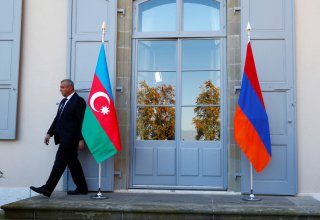An Armenia-Azerbaijan Diplomatic Breakthrough?
Washington and Brussels do the right thing for the right reason.
Two, the Michel statement also says nothing about the establishment of any sort of new foreign on-the-ground monitoring presence or oversight or anything similar—whether in the context of the delimitation of the Armenia-Azerbaijan border or in the context of the providing for the Karabakh Armenian population. Regarding the former, it does not exclude the possibility of Armenia making side deals with Russia, the CSTO, or the EU in this regard, although Azerbaijan is unlikely to take kindly to such unilateral or uncoordinated steps. Baku’s reaction to the establishment and subsequent deployment of a small, two-year European Union Mission in Armenia (EUMA) speaks to this point, as does the Armenian perception of its ineffectiveness. Regarding the latter, the statement does indicate Michel’s “encouragement” for Azerbaijan to “develop a positive agenda with the aim of guaranteeing the rights and security of this population, in close cooperation with the international community.” This, understandably is a perfectly reasonable standard for what is now accepted as being a domestic matter (more on this below), which can be achieved through the resumption of what the Michel statement calls a “transparent and constructive dialogue” between the central authorities in Baku and the local Karabakh Armenian population.
There are two evident implications of the foregoing. One, foreigners are unlikely to actively participate in Baku’s talks with the Karabakh Armenians in anything resembling the manner in which they have in the peace talks between Baku and Yerevan. This suggests that the Armenian side has dropped its earlier demand for the intra-Azerbaijan (Karabakh) discussions to take place within an “internationally mediated” mechanism. Two, no new foreign civilian, much less military, presence on the ground is likely to be established to “guarantee” the implementation of whatever ends up being agreed between the central authority and the Karabakh Armenians.
If Armenia actually strikes a deal with Azerbaijan, then normalization with Turkey will swiftly follow. The resulting peace dividend would provide Yerevan with significant diplomatic, economic, and security benefits whilst bringing Armenia back into the regional fold after three decades of political isolation. Although a derailment remains a possibility, the train does appear to be nearing its station. Not only because the West now truly seems to understand the “geostrategic stakes and is making a smart play,” as Mike Doran recently wrote, but also because all external stakeholders, including Russia, appear to have concluded that the continued pursuit of their respective interests lies in maintaining, even strengthening, their ties with Baku.
All things considered, Azerbaijan’s intensifying centripetal allure may indeed turn out to be the reason the peace process crosses the finish line.
Damjan Krnjević Mišković is Professor of Practice at ADA University and Director for Policy Research, Analysis, and Publications at its Institute for Development and Diplomacy, serving as Co-Editor of Baku Dialogues. He is a former senior Serbian and UN official (2004–2013) who previously served as managing editor of The National Interest (2002–2004). He is also a member of the Board of Editors of Orbis. The views and opinions expressed herein are solely those of the author.
Image: Shutterstock.

